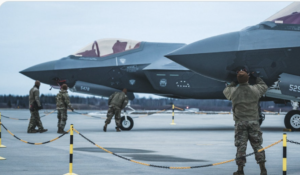
F-35s standing down
A second, 2010 article on the subject.
The author acknowledges that Trojans are known to exist and are being found in military hardware.
Outsourcing Security: Defense Manufacturing Goes the Way of the Automobile
John Lasker, Truthout, June 29, 2010
(https://www.truth-out.org/outsourcing-security-defense-manufacturing-goes-way-automobile60818)
Highlight:
Can we be sure the Chinese won’t plant Trojans or bugs in them?”
Indeed, on June 13th on 60 Minutes, Jim Gosler, an expert on cyberwarfare, said the US government has uncovered sabotaged microchips within some of the nation’s most powerful weapons. “It’s very clear that a foreign intelligence service put them there,” he added.
From the microchips that fly F-16s and activate nuclear warheads, all the way down to the lowly (but deadly) bullet, more and more US military weapons are being made overseas by foreigners.
Some experts say that outsourcing defense contracts not only costs Americans jobs and America’s connection to the war, but one of the nation’s most essential assets, as well: its security.
According to William R. Hawkins, a defense expert on military contracting and former Republican Party staffer, foreigners have been manufacturing critical and sophisticated components of US weaponry for nearly 20 years now.
He says the Pentagon started outsourcing the manufacturing of “high-end” computer chips to Taiwan in the early 1990s – microchips used in US fighter jets and missile defense systems, for instance. Over time, the Taiwanese have “second-sourced” most of these contracts to the Chinese, he says.
“Can we trust buying [high-end] chips from China for our military systems? Will they perform as well?” asks Hawkins. “We have found Chinese chips do not perform as well. They’ve also found counterfeit chips in the supply chain. Can we be sure the Chinese won’t plant Trojans or bugs in them?”
Indeed, on June 13th on 60 Minutes, Jim Gosler, an expert on cyberwarfare, said the US government has uncovered sabotaged microchips within some of the nation’s most powerful weapons. “It’s very clear that a foreign intelligence service put them there,” he added. [My emphasis.]
Hawkins says outsourcing US weapons manufacturing started gaining serious traction back in 2004, when the Bush White House and Bush Administration free market neo-cons such as Rumsfeld and Wolfowitz began to force the outsourcing of an industry they all seemingly were in love with.
“The thinking was, there’s not enough competition within the US defense industry,” says Hawkins, who acknowledges the argument has substance, but argues that doesn’t justify outsourcing.
Soon thereafter, the Pentagon awarded Brazilian jet manufacturer Embraer a $6 billion deal to build high-flying reconnaissance aircraft (spy planes). That contract would later be canceled; but the 240G machine gun is now made by Fabrique Nationale, based in Belgium. Italy’s Beretta makes the 9mm pistol which is worn by nearly every US soldier.
The American public finally woke up to the issue two years ago when a $35 billion deal was cut with European and Aeronautic Defense and Space Company (EADS) to build 179 in-air refueling tankers for the US Air Force.
The Pentagon rescinded the contract after EADS’ main American competitor Boeing protested the deal and lobbied strongly on its own behalf. On the second go-around, Boeing won the contract in March over EADS, which was caught trying to sell helicopters to Iran in 2005.
[Deleted as off topic.]
Loren Thomson, a military analyst at Washington’s Lexington Institute, says even though the American defense industry is embracing the free market strategy of outsourcing, the industry itself is still strong, in part due to its long history of weaponizing the world. According to the Stockholm International Peace Research Institute, from 2005 to 2009, the US was the number-one exporter of arms, averaging $7 billion a year.
Arguably, America began eroding its security when it gave up key civilian sectors of industry and manufacturing. It’s sheer madness to think the nation may do the same to the defense industry. But such a day hasn’t arrived, probably because the industry has powerful allies in Congress who are eager to put defense factories and jobs in their districts.
Thus one reason, says Thomas, why the US – at least for the moment – is self-sufficient when it comes to making war.
“We make a lot of weapons,” he says, “It’s one of the last few sectors not running a negative trade balance. As of today, it is not a major issue, but look at the global market and how electronics, automobiles and other manufacturing have been outsourced and undermined by foreign competitors.” The process has begun with defense.

